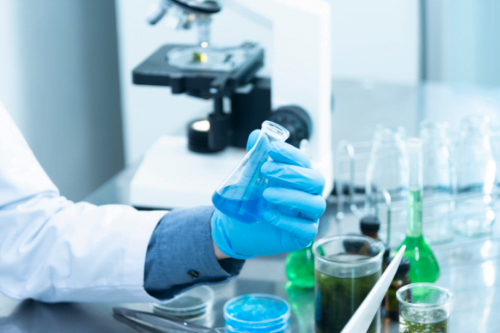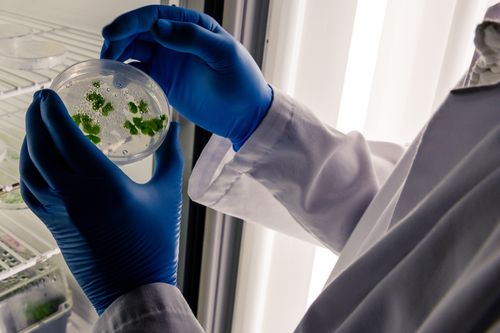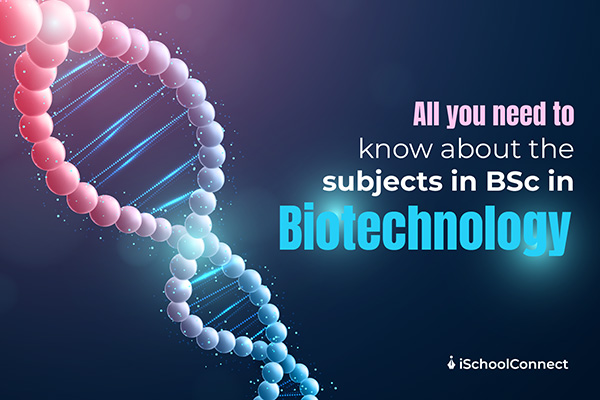Table of Contents
Statistics reveal that the global biotechnology market value was estimated at a whopping USD 1.37 trillion in the year 2022. This number is only expected to grow owing to an increase in the demand for futuristic solutions for various concerns in industries, including healthcare. If you are considering becoming a part of this lucrative field, it is crucial that you pursue a recognized biotechnology program. With an industry like biotechnology, which is evolving at an exponential rate there are multiple programs with subjects that reflect the happenings of the field. The first step to building a career in biotechnology is pursuing a BSc in Biotechnology. Continue reading to discover everything you need to know about the BSc Biotechnology subjects that make up the curriculum!
List of BSc Biotechnology subjects in each semester
A typical BSc Biotechnology program is spread over 3 years. The curriculum is, therefore, divided into a series of six semesters. Each semester comprises different subjects that are designed to help you gain relevant technical and practical skills.
The semester-wise distribution of subjects in a BSc Biotechnology program is as follows –
Semester 1
Semester 1 of a BSc Biotechnology program contains subjects that will help you create a strong foundation in the field. Some of the subjects covered in this semester include –
- Physical & Chemical Biology
- Biochemistry
- Introduction to Cell Biology & Biotechnology
- Fundamentals of Microbiology
- Biophysics & Instrumentation
- Introduction to Computer Science
- Cell Dynamics & Structure
- Macromolecular Analysis & Structure
- Biomathematics
- Biophysical Chemistry
- Cell Biology & Genetics
Semester 2

Semester 2 of a BSc Biotechnology program is a continuation of semester 1, with an emphasis on the technical aspects of the field. Some of the BSc Biotechnology subjects covered in this semester include –
- Cytogenetic Techniques
- Organic Mechanisms in Biology – Biomolecules
- Microbial Physiology & Chemistry
- Fundamentals of Biostatistics, Biocomputing, and Biochemistry
- Introduction to Digital Logic & C-Programming
- Principles of Microbiology
- Principles of Transmission Genetics
Semester 3
From semester 3 onwards, the curriculum starts becoming industry-oriented with more emphasis on the practical skills needed in the field. The different subjects covered in this semester of a BSc Biotechnology program include –
- Principles of Immunology
- Plant Biotechnology
- Microbial Genetics
- Plant & Animal Tissue Culture – Applications & Techniques
- Microbial Diversity
- Fundamentals of Molecular Biochemistry
- Cellular Metabolism
Semester 4
Semester 4 of a BSc Biotechnology program comprises subjects that will help you gain skills for extensive analysis and genetic computing. As a part of the curriculum, some of the different subjects covered in this semester include –
- Molecular Biology Techniques
- Animal Biotechnology
- Taxonomy & Biodiversity
- Protein Science
- Bio-Informatics & Computational Biology
- Molecular Genetics
- Biodiversity & Taxonomy
- Introduction to Numerical Analysis, Computer Networking & DBMS
- Bioinformatics & Analytical Techniques
- Environmental Biotechnology
- Genomics – Integrative Cell Biology
Semester 5
Semester 5 comprises a range of advanced BSc Biotechnology subjects that are designed to equip you with all the relevant skills you need at an undergraduate level. The different subjects covered in this semester include –
- Recombinant DNA Technology
- Environmental Biotechnology
- Industrial Biotechnology
- DNA Typing, Proteomics
- Immunology
Semester 6
Semester 6 of a BSc Biotechnology program wraps up the study with subjects aimed at helping you recognize aspects of the field from different lenses. Some of the subjects covered in semester 6 of the program include –
- Model Organisms in Human Genome
- Medical Biotechnology
- Introduction to Entrepreneurship
- Element Management
- Biotechnology – Ethical, Legal & Social Issues
- Applications of Biotechnology (Plants & Animals)
- Analytical Techniques
- Advanced Molecular Techniques
- Bioinformatics

BSc Biotechnology elective subjects and practical studies
In addition to the above subjects that make up the primary theoretical curriculum, the program also allows you to choose from electives. Some of the most popular elective options presented to students include –
- Scientific Writing
- Biotechnology for Forensics
- Ecology
- Nanotechnology
- Biofertilizer Technology
As a part of the program, you will also be required to undertake laboratory work to help develop industry-relevant skills. Some of the different BSc Biotechnology subjects for laboratory work include –
- Estimation of Purity of DNA
- Paper Chromatography
- Genomic DNA Isolation from Plants
- Sterilization Techniques for Glassware
- Plant Tissue Culture
- Basic Fermentation Techniques
- Genetic Engineering Techniques
- Bio-Informatics & Molecular Biology Techniques
- Immunology
- Microbiology & Cytogenetic Technique
- Microscopy & Biochemistry
- Instrumentation
Skills you need to pursue a BSc Biotechnology program
As a biotechnology aspirant, you will need to demonstrate the following skills for admission to a recognized BSc Biotechnology program –
- Innovation
- Conceptual Clarity in Biology & Chemistry
- Mathematical Skills
- Logical Skills
- Research Abilities
- Problem-Solving skills
- Scientific & Analytical Skills
- Excellent Communication Skills
- Team-Work Skills
- Attention to Detail
Employment prospects

With a BSc Biotechnology qualification, there is a range of employment opportunities that you can consider – both in the public & private sectors. Some of the different employment agencies you can consider applying to include:
- Educational Institutions
- Chemical Manufacturers
- Biotechnology Consultation Agencies
- Fertilizer Manufacturers
- Clinical Research Firms
- Ecology
- Food Production Firms
- Laboratories
- Pharmaceuticals
- Animal Husbandry
- Hospitals
- Research Firms
Top universities to pursue BSc in Biotechnology
Some of the top universities that provide BSc degree in Biotechnology are-
- University of Pennsylvania
- Columbia University
- Johns Hopkins University
- University of Toronto
- University of Calgary
- Queens University
- University of Skovde
- Northwestern University
Key Takeaways
- Biotechnology is among the fastest-growing fields in the global economy. The scope of this industry is significant with a plethora of lucrative career opportunities to choose from.
- Pursuing a reputed undergraduate program from a recognized university can equip you with the relevant skills you need for a career in the field.
- Understanding the different BSc Biotechnology subjects that comprise the program curriculum can help you recognize how industry-oriented your options are.
- To pursue a BSc Biotechnology program, you need to demonstrate a range of relevant skills including critical thinking & analytical abilities.
- There are several employment opportunities that you can consider across the public and private sectors with a BSc Biotechnology qualification.
We hope this blog helped you understand more about the subjects that are incorporated in each semester of the BSc Biotechnology curriculum, electives that you can choose, skills required and the employment prospects after the completion of the course. If you have any doubts or questions, feel free to reach out to us or drop your queries in the comments section below.
Liked this blog? Read next: Career options in biotechnology | 9 best ones!
FAQs
Q1. How many branches are present within the field of biotechnology?
Answer – There are 3 main branches within biotechnology – industrial, agricultural, and medical biotechnology.
Q2. What are the postgraduate programs I can consider after completing a BSc Biotechnology program?
Answer – The postgraduate options you can consider after completing a BSc in Biotechnology program include MBA, PhD, and MSc.
Q3. Are there any distance learning biotechnology programs available?
Answer – Yes, some universities may offer distance biotechnology programs that can take between 3 to 6 years to complete.






